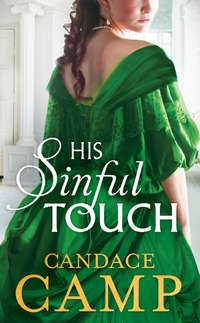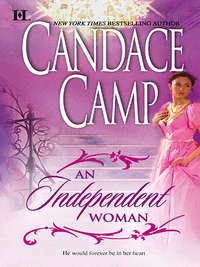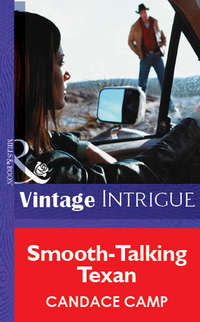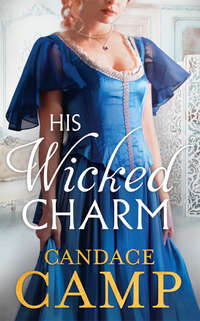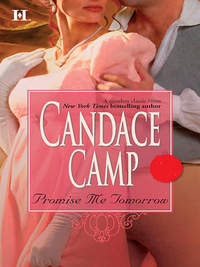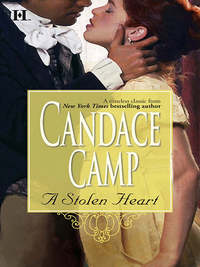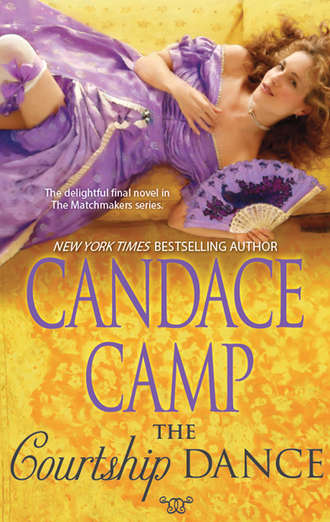
Полная версия
The Courtship Dance
“That may be, but if he does not want to marry…”
“But he must. He knows that as well as I do. He is the Duke of Rochford. He must have an heir, someone to inherit the title and estate. Rochford is far too responsible not to realize that. I will simply be helping him to do what he knows must be done.” She threw an impish grin at her companion. “And you, more than anyone else, cannot deny that I am adept at bringing to the altar even those who profess a determination not to wed.”
Irene acknowledged her words with a wry smile. “I will admit that you are expert at joining even the wariest together. However, I cannot help but wonder how the duke will take to this plan.”
“Oh, I do not intend for him to know about it,” Francesca responded blithely. “That is why you must not tell even Gideon about this. I am sure that Rochford would consider it a great interference on my part and would order me to stop it, so I have no intention of giving him that opportunity.”
Irene nodded, looking amused. “It should not be difficult to find women eager to wed the duke. He is the most eligible bachelor in the country.”
“True. I am certain that any number would wish to become his wife, but not just anyone will do. I had to find the right woman for him, which has proven to be a more difficult task than I had expected. But, then, Rochford is deserving of only an extraordinary woman, so it is no wonder that there are not many of them about.”
“Althea and Damaris are two of them, I gather. Who else have you picked out for him?”
“I have narrowed the field to three. Besides Damaris and Althea, there is only Lady Caroline Wyatt. I must talk to the three of them tonight and decide on how to throw each of them together with the duke.”
“What if he doesn’t like any of them?” Irene asked.
Francesca shrugged. “Then I shall have to find others. Someone is bound to suit him.”
“Perhaps I am being obtuse,” Irene began, “but it seems to me that the best candidate would be you.”
“Me?” Francesca cast a startled glance at her.
“Yes, you. After all, you are the one woman whom we are certain Rochford would want to marry, given that he has already asked you once. If you were to tell him you had discovered the lie, that you were sorry for not believing him…”
“No. No,” Francesca said, looking flustered. “That is impossible. I am almost thirty-four, far too long in the tooth to be a suitable bride for the duke. I shall, of course, apologize to him and confess how stupid and wrong I was. I must. But the two of us—no, that is long in the past.”
“Really?”
“Yes. Really. Pray do not give me that disbelieving look. I am certain of this. You know that I am done with marriage. And even if I were not, it has been too long, and too much has happened between us. He could never forgive me for breaking it off with him—not to that extent. Rochford is a very proud man. And whatever feeling he might have had for me once, by now it is long dead. It has been fifteen years, after all. I do not still love him. Even less would he harbor any love for the woman who rejected him. Why, for ages he scarcely even spoke to me. It has only been in the past few years that we have been something like friends again.”
“Well, if you are certain…?”
“I am.”
Irene shrugged. “Then what do you intend to do?”
“I…ah! There is Lady Althea.” Francesca had spotted her quarry standing beyond the dancers, chatting with another woman. “I shall start with her. I think that I may chat with her a bit, maybe plan an outing together. Then I can arrange it so that Rochford makes up one of our party.”
“If that is your plan, it seems that fortune has smiled on you,” Irene told her, nodding toward another part of the ballroom. “Rochford just walked in.”
“He did?” Francesca’s heart sped up a bit, and she turned to look in the direction her friend indicated.
It was Rochford, all right, effortlessly elegant in formal black and white, and easily the most handsome man in the room. His thick black hair was cut into an artfully casual style that many copied but few could achieve, and his lean, tall figure was perfectly suited for the close-fitting trousers and jacket that were the current fashion. There was nothing ostentatious about him—the only decoration he wore was a stickpin anchoring his cravat, the head of which was an onyx as dark as his eyes—yet no one, seeing him, would have thought him anything less than an aristocrat.
Francesca’s hand tightened on her fan as she watched him glance about the room. Every time she had seen him lately, she had felt this same roiling mixture of emotions. It had been years since she had felt this way, so jittery and filled with trepidation, yet strangely excited, as well. Daphne’s words, she reflected, had opened some sort of door on the past, letting in a whole host of feelings that she had thought time and experience had worn away.
It was entirely foolish, she realized. Knowing, as she did now, that Rochford had not been unfaithful to her made no real difference in her life. Nothing had changed because of it, and nothing would. Yet she could not deny the little spurt of joy it aroused in her whenever she saw him. He had never belonged to Daphne; his firm, well-cut mouth had not kissed her, nor whispered in her ear. His hands had not caressed her or showered her with jewels. The mental pictures that had tortured her fifteen years ago had been entirely false, and she could not help but be glad of it.
Francesca turned away, suddenly busy with her gloves and fan, smoothing down the front of her skirt. “I must tell him,” she said softly.
She knew that she could not be at ease around him again until she had revealed what she had learned and apologized for not trusting or believing him. And, clearly, she could not match him with a wife if she could not even be around him without going into a fit of nerves. She must tell him…but how?
“I think that you are about to get your chance,” Irene told her dryly.
“What?” Francesca looked up.
And there, climbing the stairs toward them, was the Duke of Rochford.
CHAPTER TWO
FRANCESCA FROZE, aware of a craven impulse to flee. But she could not, of course. Rochford was looking straight at her. She could not turn away without being rude. Besides, Irene was right: this was her opportunity to explain everything to him.
So she stood her ground and smiled as the duke approached them.
“Lady Haughston. Lady Radbourne,” he greeted them, sketching a bow.
“Rochford. How nice to see you,” Francesca replied.
“It has been a long time. I have seen you at few parties.”
She might have known that he would notice. Rochford rarely missed anything. “I…have been resting a bit since Callie’s wedding.”
“Have you been ill?” He frowned.
“Oh. No. No, not at all. Um…” Francesca sighed inwardly. Hardly two sentences spoken, and already she was floundering.
She found it the most difficult thing to lie to Rochford. Even the most innocuous social lie that she might blithely relate to anyone else seemed to curdle and die on her tongue when she was faced with his dark gaze. She felt sometimes as though his eyes could look deep inside her, see to the very depths of her soul.
She glanced away from those eyes now as she went on. “I was not ill, merely…tired. The Season can grow somewhat wearying, even to me.”
She had the distinct feeling that he did not believe her. He studied her for one long moment more, then gracefully replied, “None would know it, I assure you. You are as radiant as always.”
Francesca acknowledged his compliment with a gracious nod, and he turned toward Irene. “As do you, my lady. Marriage seems to suit you.”
“It does,” she admitted, sounding faintly surprised.
“Is Radbourne here this evening?” he asked. “I am surprised not to find him by your side.”
“That is because Irene deserted him,” Francesca put in, grinning.
“’Tis true,” Irene agreed. “I abandoned him to Lady Pencully’s clutches and fled like a coward for the stairs.”
“Good Gad, is Aunt Odelia here?” he asked, casting an alarmed glance toward the ballroom below.
“Yes, but she will not climb the stairs,” Francesca replied. “So long as you stay up here, you are safe.”
“I would not be so sure. The woman seems to have become positively reinvigorated since her eightieth birthday ball,” Rochford responded.
Irene glanced over at Francesca, then said lightly, “I suppose I had better play the good wife and go rescue Gideon before his patience grows too thin and he says something to her that he will later regret.”
Francesca quelled the spurt of panic that rose in her at her friend’s departure. She had conversed with the duke hundreds of times; it was absurd that it should suddenly seem so awkward.
“How is the duchess?” she asked once Irene had left, for want of anything better to say.
“Grandmother is well and enjoying Bath. She keeps threatening to come for at least a few weeks of the Season, but I think she will not. She is too relieved at no longer having to do her duty by chaperoning Callie.”
Francesca nodded. That seemed to be the end of that topic. She shifted nervously and glanced out over the ballroom again. She had to tell him, she knew. She could not continue in this way, being shy and uncomfortable around him. Over the past few years, she had become accustomed to having him as something of a friend again. She looked forward to conversing with him at parties; it was always enlivening to bandy words with him, and his wit made even the most boring gathering tolerable. And she could count on him for a waltz, which meant that at least one dance of the evening would be effortless, like floating around the floor.
She had to make amends. She had to confess and ask his forgiveness, no matter how much the thought of it frightened her.
She glanced up and found him watching her, his dark eyes thoughtful. He knew, she thought; the man was simply too discerning. He knew that there was something wrong with her. With them.
“Perhaps you would care to take a stroll with me,” he told her, offering her his arm. “I understand that the Whittingtons’ gallery is quite enjoyable.”
“Yes. Of course. That sounds quite pleasant.”
Francesca placed her hand upon his arm and walked with him through the double doors into the long hallway running along one side of the Whittington mansion. The gallery was hung with portraits of ancestors and a variety of other subjects, including a favorite hunter or dog of one Whittington or another throughout the centuries. They strolled along, now and then glancing at the pictures, but with little real interest. There was no one else about, and their steps echoed hollowly on the polished parquet floor. Silence stretched between them, growing deeper and more awkward with each passing moment.
Finally Rochford said, “Have I offended you past remedying?”
“What?” Startled, Francesca’s eyes flew to his face. “What do you mean?”
He stopped and turned to face her. His expression was solemn, his straight black eyebrows drawn together harshly. “I mean that while ’tis true that I have seen you at few parties in the past weeks, you have been at some of them—and whenever you saw me, you immediately turned and disappeared into the crowd. And if, by chance, you came upon me unexpectedly, with no way to avoid the encounter, you seized the first opportunity to make your excuses and leave. I can only assume that you have not forgiven me for what I said to you that day, when I found out that Bromwell had been courting Callie.”
“No!” Francesca protested, laying a hand earnestly upon his arm. “That is not true. I did not blame you. Truly I did not. I… Perhaps you were a bit harsh. But you apologized. And, clearly, you had reason to be concerned. But I could not betray Callie’s trust, and she had the right to choose her own future.”
“Yes. I know. She is quite independent.” He sighed. “I realize that you had little choice, and I had no reason to expect you to be able to control my sister. God knows, I had poor enough luck at it. And once I was over my anger, I knew I was in the wrong. I apologized, and I thought you had accepted my apology. But then you began hiding from me.”
“No, truly…” Francesca told him. “I did accept your apology, and I am not angry with you about what you said. I have seen your temper a time or two before, you know.”
“Then why are you upset with me?” he asked. “Even at Callie’s wedding, I saw you but little.” He stopped abruptly, then asked, “Was it because of that scene at the hunting lodge? Because I—” He hesitated.
“Because you knocked your sister’s future husband to the floor?” Francesca asked, a smile hovering at the corners of her lips. “Because the two of you were brawling through the parlour, knocking vases off tables and overturning chairs?”
Rochford started to protest, then stopped, his own mouth twitching into a small smile. “Well…yes. Because I was acting like a ruffian. And making a general fool of myself.”
“My dear Duke,” Francesca drawled, laughter glimmering in her eyes, “whyever should I have taken exception to that?”
He let out a short laugh. “Well, at least you have the good grace not to say that it is nothing unusual. Although I might point out that while I may have been a ruffian, at least I was not telling enormous clankers, as were some of us.” He shot her a droll look.
“Clankers!” Francesca tapped his arm lightly with her fan, scarcely noticing that the awkwardness had fallen away from them and she was bantering with him once again in a carefree way. “You are most unjust, sir.”
“Come, now, you cannot deny that you were…shall we say, most inventive that morning?”
“Someone had to bring that mess into some order,” she shot back. “Else we would all have been in a pretty predicament.”
“I know.” His face sobered, and he reached out, surprising her, and took her hand. “I know how much you did for Callie that day. You earned my undying gratitude for your ‘inventiveness.’ And your kind heart. Callie would have been embroiled in a serious scandal if it were not for you.”
Francesca felt her cheeks growing warm under his steady regard, and she glanced away. “There is no need to thank me. Indeed, I am quite fond of Callie. She is much like a sister to me.”
It occurred to her then that her words had been unfortunate, and she blushed even harder. Would Rochford think her presumptuous? Or assume that she was reminding him of the fact that they had nearly become man and wife?
Francesca turned and continued walking. Her hand was curled so tightly around her fan that the sticks were digging into her flesh. Rochford fell in beside her, and for a moment they walked in silence. She could feel him watching her. He knew something was wrong. She was only making it worse and prolonging her own anxiety.
“I have to apologize to you,” she blurted out suddenly.
“Excuse me?” he asked, surprise clear in his voice.
She stopped and turned to him, steeling herself to look up into his face. “I wronged you. Fifteen years ago, when we—” She stopped, feeling as though her throat was closing up on her.
He stiffened slightly, the puzzlement on his face turning to a slight wariness. “When we were engaged?” he finished for her.
Francesca nodded. She found she could not hold his gaze, after all, and she glanced away. “I— At Callie’s wedding, Lady Swithington told me—she said she lied about the two of you. That there was never anything between you.”
When he said nothing, Francesca squared her shoulders and forced herself to look back up at him. His face was still, his gaze shuttered, and she knew no more of what he was thinking or feeling than she had when she was turned away from him.
She swallowed and went on. “I was wrong. I accused you unjustly. I should have listened to you, heard you out. And I—I wanted you to know that I am sorry for what I said to you, for what I did.”
“Well…” He half turned from her, then swung back. “I see.” He was silent for a moment longer, then said, “I am afraid I don’t know what to say.”
“I don’t know that there is anything to say,” Francesca admitted, and they turned and began to stroll back the way they had come. “There is nothing to be done. It is all long over. But I could not feel easy without telling you how wrong I was. I don’t expect you to forgive me. But I wanted you to know that I learned the truth, and that I am sorry for misjudging you. I should have known your character better.”
“You were very young,” he replied mildly.
“Yes, but that is not an adequate excuse, surely.”
“I daresay.”
Francesca cast a sidelong glance at the duke. She had worried that when she told him, he would slice her with a cold, acerbic remark. Or that his eyes would light with fury, and he would storm at her or stalk away. She had not considered that her confession might render him speechless.
They walked through the double doors leading into the upper level of the ballroom and stopped, turning toward each other awkwardly. Francesca’s heart hammered in her chest. She did not want to simply part from him this way, unsure of what he thought and felt, not knowing if he was seething inside or simply relieved to know that she no longer believed him a cad. She could not bear it, she thought, if her confession resulted in the ruination of the delicate friendship they had built over the years.
Impulsively, she asked, “Shall we dance?”
He smiled faintly. “Yes, why don’t we?”
He extended his arm to her, and they started down the curving staircase.
A waltz struck up just as they reached the floor, and Rochford swept her into his arms and out to join the dancers. Something fluttered inside her, soft and insistent, and she was suddenly uncertain and nervous, yet almost giddy, as well. She had danced with the duke many times over the course of the past few years, but somehow, in this moment, it felt different, even new. It felt…almost as it had years before.
She was very aware of the strength of his arms encircling her, his warmth, the smell of his cologne mingled with that faint, indefinable scent that was his alone. She remembered how it had been that Boxing Day, at the ball he had given at Dancy Park, when he had taken her into his arms for a waltz, and she had looked up at him and realized that the girlish infatuation she had felt for him for years was something much more. Gazing into the depths of his dark eyes, she had known that she was hopelessly, madly in love with the man. She had been dizzy with excitement, her entire body tingling with awareness of him. He had gazed back down at her and smiled, and in that moment, heat had burst inside her like a sun.
Staring up at him now, Francesca felt color rush to her cheeks at the memory. He looked so much the same; if anything, the years had only added to his handsomeness, the faint lines at the corners of his eyes softening the sharp planes and angles that could make his face appear cold. He had always looked a bit like a pirate, she thought, with his black eyes and black hair, and the high swooping line of his cheekbones. Or at least he appeared that way when his straight black brows drew together, or when he turned his level, icy stare on one. At those moments he seemed a trifle dangerous.
But when he smiled, it was a different matter altogether. His face lit up and his eyes warmed, and his mouth curved in a most inviting way. It was almost impossible not to smile back at him at such a moment, and, indeed, it made one want to do something to bring that smile out again.
She glanced away quickly, embarrassed at the direction of her thoughts. She hoped that he had not seen her blush or had any idea what had brought it about. It was absurd, of course, for her to be nervous or eager. And even more laughable for her thoughts to go skittering to juvenile maunderings about his good looks or appealing smile. She was long past such feelings—for Rochford or anyone else. Whatever girlish love she had felt for the man had died many years ago, burned away by long nights of sleepless anguish, drowned in a sea of tears.
She cast about for some topic to bridge the silence. “Have you heard from Callie?”
“I have had a letter from her. Very brief, I might add. ‘Paris is beautiful. Bromwell is wonderful. Looking forward to Italy.’”
Francesca chuckled. “Surely ’twas not quite so short as that.”
“Oh, no, there was a bit more description of Paris. But all in all, it was a model of brevity. Their plan is to return to London in another week—if, of course, they do not decide to extend the honeymoon.”
“Well, at least it sounds as if she is happy.”
“Yes. I believe she is. Against everything I would ever have thought, Bromwell apparently loves her.”
“It must be lonely for you without her.”
“The house is a trifle quiet,” Rochford admitted with a faint smile. “But I have kept busy.” He raised an eyebrow at her. “What about you?”
“Have I kept busy? Or have I been lonely without Callie?”
“Either. Both. She was with you more than she was at home the last two months before she married.”
“That is true. And I have found that I miss her,” Francesca admitted. “Callie is…well, her leaving creates a larger hole in one’s life than I would have imagined.”
“Perhaps you should take another young lady under your wing,” Rochford suggested. “I have seen a number of women here tonight who could do with an application of your expert touch.”
“Ah, but none of them has asked for my help. It is a bit rude, you know, to offer one’s opinion, unasked, on how another can be improved.”
“I suppose it would be. Although one cannot help but wish that you might say something to Lady Livermore.”
Francesca stifled a giggle, following the direction of Rochford’s eyes to where Lady Livermore was dancing with her cousin. She was wearing her favorite color, a strong puce that would show to advantage on very few women. Lady Livermore was not among them. The color would have been bad enough in itself, but Lady Livermore was of the opinion that if something was good, then more of it was even better. Ruffles festooned the neckline of her dress and the bottom of the skirt, billowing out beneath the scalloped hemline of her over-dress. Even the short puffed sleeves carried two rows of ruffles. Silk rosettes marked the upward points of the scallops, each one centered by a pearl, with a swag of pearls stretching from point to point. A pearl-trimmed toque of matching color sat atop her head.
“Lady Livermore, I fear, is unlikely to change,” Francesca told him. She paused for a moment, then said, “Do you know Lady Althea?”
Francesca could have bitten her tongue as soon as she said it. How could she have blurted that out so clumsily?
“Robart’s daughter?” the duke asked in a surprised tone. “Do you think that she needs help finding a husband?”
“Oh, no! Goodness.” Francesca let out a little laugh. “I am sure Lady Althea has no need for any help from me. I just saw her dancing with Sir Cornelius, that’s all.” She paused, then went on. “I am sure that she has no lack of suitors. She is quite attractive, don’t you think?”
“Yes,” Rochford answered. “I suppose she is.”
“And accomplished, too. She plays the piano quite well.”
“Yes, she does. I have heard her play.”
“Have you? She is much admired, I understand.”
“No doubt.”
Francesca was aware of a distinct spurt of annoyance at his reply. She was not sure why the duke’s agreeable admissions of Lady Althea’s excellence irritated her. After all, her job would be much easier if Rochford already found the woman appealing. And surely she was not so vain herself that she could not bear to hear another woman praised. Still, she found it hard not to respond sharply, even though she herself had raised the subject.
She turned the conversation to something else, but later, when the music ended, she subtly maneuvered Rochford into walking off the dance floor in the direction that Lady Althea and her partner had taken. She was lucky enough that Sir Cornelius was taking his leave of the lady as they approached.


